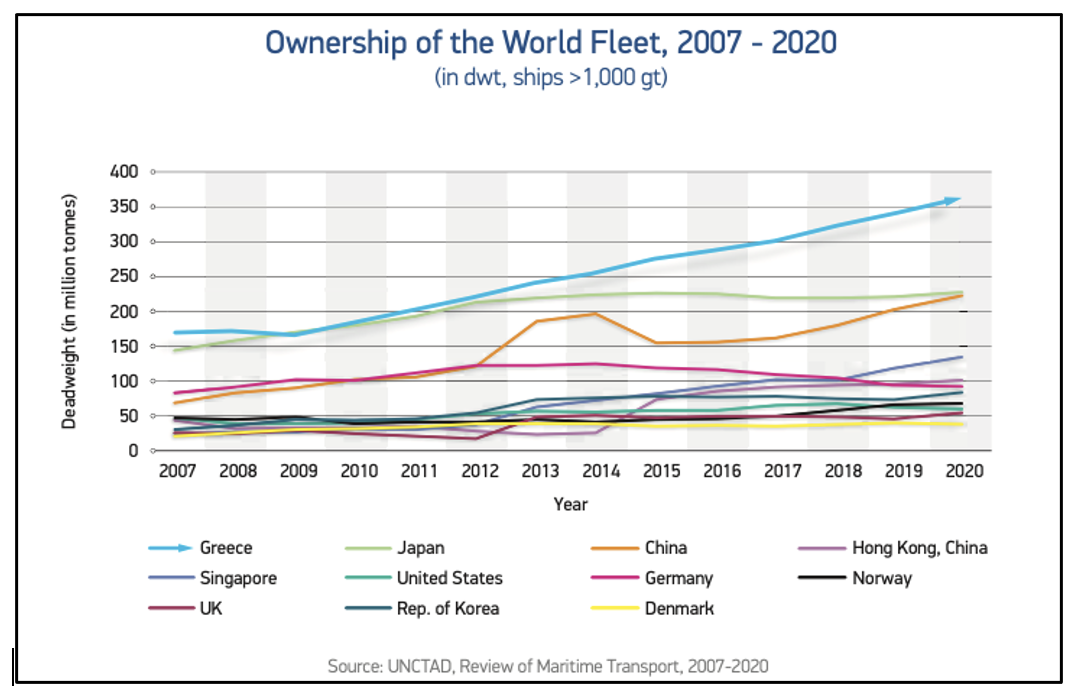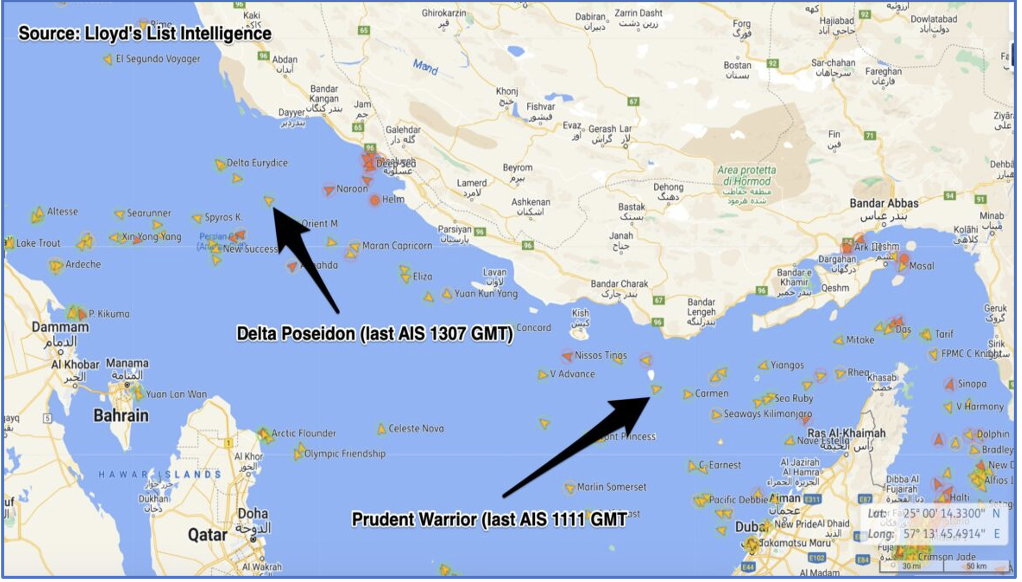Freedom of Navigation in Strait of Hormuz Again Under Challenge
On May 27, Iran’s paramilitary Revolutionary Guard launched helicopter raids in the Strait of Hormuz to detain two loaded Greek oil tankers, Delta Poseidon and Prudent Warrior. Greece accused the Iranian government of piracy and called for the immediate release of both vessels.
The illegal detention of these vessels was initially said by the Iranian authorities to be in response to unspecified violations but was subsequently acknowledged to be in direct retaliation for the Greek government’s assistance to the United States in seizing the cargo of an Iranian flagged and Russian manned tanker Lana (ex Pegas) in Greek waters over a violation of sanctions.
 M.V. Lana transferring Iranian oil to the tanker M.V. Ice Energy off the island of Evia in eastern Greece
M.V. Lana transferring Iranian oil to the tanker M.V. Ice Energy off the island of Evia in eastern Greece
To complicate matters, permission granted for the U.S. to seize the Lana’s cargo was then overturned by a Greek appeal court and Iran has demanded return of the cargo.
While attacks on tanker traffic and arbitrary vessel detentions go back to the Iran-Iraq war (1980-88) when the lives of seafarers were lost and several vessels damaged by both sides, periodic seizure of vessels has continued as Iran tests the resolve of western naval forces to protect merchant shipping in the Strait of Hormuz. Iran detained the UK flag tanker Stena Impero for two months in 2019 when in Omani territorial waters following the UK’s detention of an Iranian tanker off Gibraltar. A similar incident occurred in 2021 involving a South Korean flagged product tanker Hankuk Chemi. Iran demanded the return of US$7 billion in funds frozen in South Korean banks because of US sanctions in return for release of the vessel. The vessel was released after three months, apparently with no resolution to Iran’s claim.
About 20% of daily crude oil supply passes through the Strait of Hormuz and with Iran seemingly capable of detaining vessels in international waters at random and with impunity, the International Chamber of Shipping and the European Community Shipowners’ Association (ECSA) has issued a joint statement calling for a “quick and diplomatic resolution” for the Greek vessels and crew to be released. Greece has good reason to be concerned given that around 25% of the global tanker fleet is Greek owned.
 Greece has good reason to be concerned given that around 26% of the global tanker fleet is Greek owned. Greek shipowners also control 21% of total global shipping capacity (364 million tonnes DWT) and 58% of capacity in the EU according to 2020 statistics.
Greece has good reason to be concerned given that around 26% of the global tanker fleet is Greek owned. Greek shipowners also control 21% of total global shipping capacity (364 million tonnes DWT) and 58% of capacity in the EU according to 2020 statistics.
Meanwhile, the squeeze on Russian shipping following that country’s invasion of Ukraine means that Sovcomflot has been forced to sell around a third of its fleet of approximately 120 ships. While the EU has sanctioned Russian oil, it has not stopped EU based owners of tankers registered in Greece, Cyprus and Malta taking advantage of increased freight rates to move cheap Russian oil across the globe. This poses a dilemma for marine insurers who are struggling to interpret ambiguous legislation in support of EU sanctions targeting Russia. The most recent legal framework calls for EU countries to phase out imports of seaborne Russian crude over a six-month period and prohibit insurance or reinsurance of shipments of crude oil and petroleum products to third countries.
While legalities are being debated, sanctions busting is becoming ever more creative. A recent example is a ship-to-ship transfer in the Atlantic Ocean in late May, 300 miles west of the island of the Portuguese island of Madeira. In this case, the Aframax tanker Zhen I registered in Palau transferred oil to the Panama flagged VLCC Lauren II. To say the least, it is unusual for such transfers to take place beyond sheltered waters as the risks are so high.
In the big picture, both China and India have stepped up Russian oil imports at a discount on today’s global prices thereby continuing to indirectly help finance the war on Ukraine. The fractured geopolitical climate seems certain to keep the pressure on mainstream shipping while others continue to roll the dice in search of profits.

